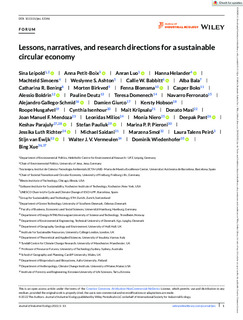
Título
Lessons, narratives, and research directions for a sustainable circular economyAutor-a
Autor-a (de otra institución)
Fecha de publicación
2022Otras instituciones
Helmholtz Centre for Environmental ResearchUniversity of Jena
Universitat Autónoma de Barcelona
University of Freiburg
Ikerlan
Rochester Institute of Technology
Universitat Pompeu Fabra
ETH Zürich
University of Southern Denmark
Universität Hamburg
Norwegian University of Science and Technology (NTNU)
Technical University of Denmark
University of Hull
University College London
University of Insubria
University of Manchester
University of Technology Sydney
Cardiff University (UK)
Aalto University (Finland)
University of Maine
Estonian University of Life Sciences
Versión
Version publicadaTipo de documento
ArtículoArtículoIdioma
InglésDerechos
© 2022 The AuthorsAcceso
Acceso abiertoVersión de la editorial
https://doi.org/10.1111/jiec.13346Publicado en
Journal of Industrial Ecology Editorial
WileyPalabras clave
industrial ecology
narratives
policy relevance
research agenda ... [+]
narratives
policy relevance
research agenda ... [+]
industrial ecology
narratives
policy relevance
research agenda
science policy
sustainability [-]
narratives
policy relevance
research agenda
science policy
sustainability [-]
Resumen
The current enthusiasm for the circular economy (CE) offers a unique opportunity to advance the impact of research on sustainability transitions. Diverse interpretations of CE by scholars, however, pr ... [+]
The current enthusiasm for the circular economy (CE) offers a unique opportunity to advance the impact of research on sustainability transitions. Diverse interpretations of CE by scholars, however, produce partly opposing assessments of its potential benefits, which can hinder progress. Here, we synthesize policy-relevant lessons and research directions for a sustainable CE and identify three narratives—optimist, reformist, and skeptical—that underpin the ambiguity in CE assessments. Based on 54 key CE scholars’ insights, we identify three research needs: the articulation and discussion of ontologically distinct CE narratives; bridging of technical, managerial, socio-economic, environmental, and political CE perspectives; and critical assessment of opportunities and limits of CE science–policy interactions. Our findings offer practical guidance for scholars to engage reflexively with the rapid expansion of CE knowledge, identify and pursue high-impact research directions, and communicate more effectively with practitioners and policymakers. [-]
Colecciones
- Artículos - Ingeniería [761]
El ítem tiene asociados los siguientes ficheros de licencia:





















